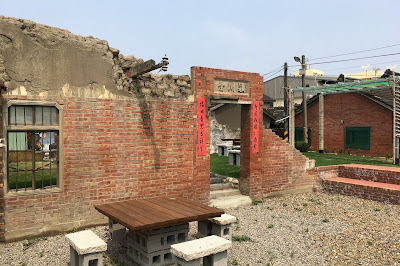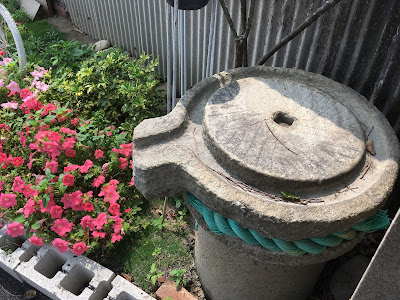2021年3月31日 星期三
The Most Important of All
2021年3月29日 星期一
A Short Visit to "Wu Lu"
2021年3月28日 星期日
Palm Sunday, 2021
2021年3月25日 星期四
My Former Colleagues
2021年3月23日 星期二
We Took a Photo Together
2021年3月21日 星期日
Stop, Look, and Listen!
for the 5th Sunday in Lent
To See the Meaning of the Parable, and to Hear the Voice
I.
My
reflections on life in Lent:
The season of Lent lasts from Ash Wednesday to the
evening of Holy Saturday, the night before Easter Sunday. This calculation
makes Lent last 46 days if the 6
Sundays are included, but only 40 days if they are excluded. Traditionally, the number 40 has special
meaning and is especially important. And it’s also important that the final
week of Lent is Holy Week, starting with Palm Sunday.
Time flies! Next Sunday is Palm Sunday. And today,
as you can see, we’re here celebrating the fifth Sunday in Lent. Do you
remember the three traditional practices to be taken up with renewed vigor during Lent? – They are
(1) prayer, justice towards God; (2) fasting,
justice towards self; and (3) almsgiving, justice towards
neighbors. These are known as the three pillars of Lent.
Look! On the front page of the Leaflet that we’re
using for the service, you can see 3 small images that represent prayer,
fasting, and almsgiving. Now we’ve come to the
fifth Sunday in Lent. How do you feel about your life in the past few weeks? Do
you think we’ve been living in a good way (or a proper manner) in Lent? Are we
living a simple life as expected? Or living a life that is more holy
than before?
When I asked myself these questions (as mentioned
above), I found it a little embarrassing to answer: Yes, I did have a
regular life these days, a life simple enough! As I’m in my
retirement, I can make my everyday life simple and easy. Probably my current life
is much easier than many who [have to] go to work or to school every
day. But I don’t think I’ve been living in a way that fits well with the season
of Lent.
In these past weeks, I prayed often,
but I didn’t fast. I didn’t abstain or reduce any delicious food.
I didn’t drink alcohol, but I took too much coffee every single day. As for almsgiving,
I must confess that I’ve given very little to others. As I’m not interested in
making money, I tend to save what I’ve had. I give money just to my family and,
literally, to my beloved ones!
So, now, let me “stop, look, and listen” for a
while. I need to adjust my pace and take notice – take notice of the so-called “spiritual
journey.” Just as I always tell my little grandchildren to stop, to look,
and to listen before they run out of the alley in front of my house trying
to get across the main road, so do I want myself to “slow down” and pay
attention to God’s guidance on my spiritual way!
Well, at this very moment I’d like to turn to the
Gospel reading for today; and I’d like to invite all of you to hear (and follow)
the Voice of the Lord – and to see (and grasp) the true meaning of the Parable
of a Grain of Wheat. Our Lord Jesus used that very short but meaningful
parable to teach his followers at that time, whether they were Jews or Greeks.
II.
See
and Grasp the Meaning of the Parable:
Today’s Gospel story starts with some
Greeks asking to see Jesus. In Jesus’ time, Greeks were seen as foreigners,
or outsiders, from the Jews’ point of view. When those gentile
people wanted to see Jesus, would Philip and Andrew have a strange feeling
about it? Was it such an awkward situation in which the Greeks shouldn’t or
couldn’t get close to a Jewish rabbi at all?
Anyway, Philip and Andrew came and told
their Teacher that some Greeks had arrived asking to see him. And, as he so
often did, Jesus answered indirectly. He didn’t say, “Send them away” or “Sure let them come in.” Instead, he took the moment to teach – to
lay out a reality that his followers needed to understand.
In today’s Gospel reading, we see that Jesus
used a parable to explain how not only Greeks but everyone would see him.
Jesus said, “I’m
telling you the truth: a grain of wheat remains no more than a single grain
unless it is dropped into the ground and dies. If it does dies, then it
produces many grains.” At first glance,
this teaching looks easy to comprehend, doesn’t it?
A seed, by itself, is only a small piece
of matter. If it is eaten, it provides a little bit of nourishment. If
it is left in the blazing sun, it can dry up and lose its value. If it
is sealed in a jar, it can remain viable for centuries. But even then, it
is only potentially powerful. But if it is buried and dies beyond its
present condition, then it can release all that is contained within – that
is, the very nature and substance of a whole stalk of ripened wheat.
All the above if’s and then’s
are logically true, and they can be established in the field of science. But
the meaning of the Parable is obviously beyond those botanical things; there
was something more that our Lord Jesus wanted his followers to understand. (He
wants us to see and grasp the true meaning of the Parable, as well.) After
telling the Parable, Jesus taught in the form of a paradox such an
important concept: “Those who
love their own life will lose it; those who hate their own life in this world
will keep it for life eternal.”
This concept, which sounds like a paradox,
is hard to be explained, isn’t it? But I think Jesus had good reasons to say so.
Some Bible scholars believe that Jesus added this amplification to the
parable because he wanted to make sure there
would be no mistaking the stark reality of what he meant.
Jesus was there speaking about his death
[John 12:23-33]. He said, “The
hour has now come for the Son of Man to receive great glory.” He
used the word “glory.” Like many other words, glory may mean very
differently. For us glory is about having more: more money, more
prestige, more power. For Jesus, glory was about giving more, and he
demonstrates this throughout John’s Gospel, especially in its final chapters.
Jesus gives himself to his friends by washing their feet. Then he gives himself
to the world by dying on the cross.
And Jesus’ death and resurrection would be
the vehicle through which not only his
disciples and curious Greeks, but all humankind, could see Jesus – truly see
what he was all about. It was by dying that the power of God
contained in Jesus would be fully released. By “glorified,” Jesus meant
crucified. Jesus was saying that only by his death could true life come.
Just as a grain of wheat, remaining unfruitful
in the protective security of a barn, can only release its power by being
buried and dying to what it has been!
Now let’s see and catch the meaning of the
Parable of a Grain of Wheat. Simply speaking, the Christian reality is
that only in dying to self can the power of God be embraced and released.
Jesus laid out this perfect example not just for the disciples to see but also to follow. So he said, “Whoever
wants to serve me must follow me, so that my servant will be with me where I
am. And my Father will honor anyone who serves me.” [John
12:26]
III.
Hear
the Voice of the Lord:
Now once again I’d like to say, “Stop,
look, and listen!” In addition to seeing the gist and the “deeper meaning” of the
above-mentioned Parable, we must listen carefully for the Voice of the Lord.
Yes! To hear the Voice – the voice from
God, the voice of the Lord!
I’d rather capitalize the initial
letter of the word “Voice,” for I believe if we’re attentive, we’ll be able to
hear that kind of voice – just with our “heart and mind,” not with our ears. In
Verses 28-30, Jesus prayed, “Father, bring glory to your
name!” Then a voice spoke
from heaven, “I have
brought glory to it, and I will do so again.” The crowd standing there heard the voice, and some of them said it was thunder, while others said, “An angel spoke to him!”
But Jesus
said to them, “It was not for my sake that this voice spoke, but for yours.” If we
had also been there with Jesus and the followers, would we have heard the same voice?
Are we now able to hear some Voice from heaven? … If we haven’t had any “hearing”
experiences of that kind, is it because we have been too busy to be listening? Or
because we are too sophisticated to hear voices? Or because we are too grown up
– no more like children who can hear the Voice? (Remember, Jesus says we are to
come to the kingdom like children.)
Furthermore,
if we have never heard anything spoken by the Lord, how can we follow him? By
“hearing the Voice,” I mean God’s words suddenly come to us at a critical time,
or on some special occasion; and the words, the Voice, being so clear and so powerful,
will truly help us and improve our life (esp. our spiritual life!). Just as we
can recall what we have learned by heart – some “inspiring words” (or wise
sayings) in the Holy Bible, for example, if we keep praying and seeking the
Lord’s Voice, we’ll be able to hear it. A lot of it!
Next Sunday is Palm Sunday. The beginning
of Holy Week, the most important week in the Christian year. We need to listen
for the Voice. The Voice that is for our sake, not for Jesus. The Voice
speaks to us so that we might know how beloved we are. So that we might
know how well pleased God is with us. Once we hear this voice and
believe it, others will see Jesus, in all that we say and all that we do.
So, to prepare ourselves for a new
beginning, let’s “Stop, look, and listen” for now! – Stop, look, and listen … [AMEN.]


































































